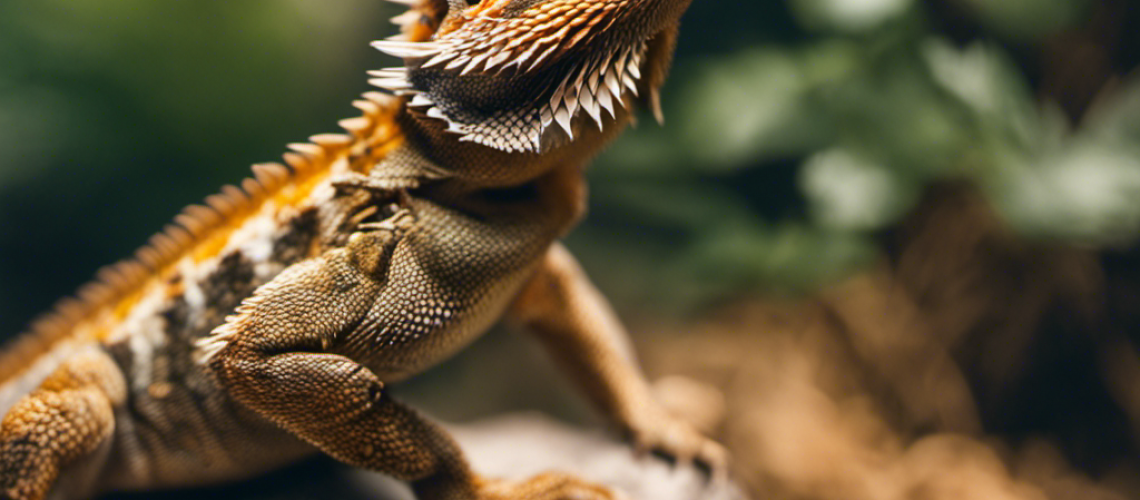Bearded dragons are a popular pet among reptile enthusiasts. To ensure the health and wellbeing of these animals, it is important to provide them with a balanced diet that consists of vegetables, fruits, and insects.
This article will explore the types of safe insects for bearded dragons as well as their nutritional benefits. It will also discuss how to prepare and monitor an insect-based diet for bearded dragons in order to keep them healthy and happy.
Key Takeaways
- Variety in diet is essential for bearded dragons
- Feeding live insects provides exercise and mental stimulation
- Gut loading increases nutrition intake for reptiles
- Choosing safe and healthy options is critical for maintaining the dragon’s health
Types of Insects for Bearded Dragons
The types of insects best suited for the health of a bearded dragon should be carefully considered. Feeding patterns, habitat requirements, and gut loading all must be taken into account when selecting which insects to provide.
Variety in diet is essential as is understanding the nutritional value each bug offers. Enrichment activities should be considered along with appropriate size and safety precautions to make sure your dragon’s needs are met.
Selecting an insect that meets the specific needs of your dragon can ensure a healthy, happy reptilian companion.
Nutritional Benefits of Insects
An essential aspect of providing optimum nutrition for reptiles is the inclusion of insects in their diet. Feeding methods, gut loading, and nutrient content are all important factors to consider:
- Feeding Methods: Live insects provide exercise and mental stimulation, while pre-packaged food requires less effort but can be lacking in nutritional value.
- Gut Loading: Ensuring that insects have been well fed prior to consumption increases nutrition intake for reptiles.
- Nutrient Content: Insects contain a wide variety of vitamins and minerals necessary for healthy growth.
Safe Insects for Bearded Dragons
Choosing the appropriate insects for bearded dragons is critical to maintaining their health. Interactive enrichment and nutrient variety are important factors in selecting safe and healthy options.
Mealworms, waxworms, crickets, dubia roaches, silkworms, and hornworms are common choices that provide adequate nutrition. Calcium should be added to food items as a supplement to ensure proper growth and development.
Additionally, dusting live insects with vitamins every week can add valuable nutrients such as phosphorus and magnesium.
Preparing Insects for Bearded Dragons
Appropriately preparing insects for bearded dragons is essential to ensure they receive the nutrients they need. Breeding insects, when done correctly, provides them with a consistent source of food.
Feeding methods should be varied and include:
- Live Insects: such as crickets, mealworms, waxworms
- Frozen/Freeze-Dried Insects: like mealworms and silkworms
- Vegetables & Fruits: offering variety in nutrition.
Creative feeding techniques can help encourage freedom while providing balanced nutrition for improved health.
Monitoring Your Bearded Dragon’s Intake of Insects
Monitoring the quantity of insects consumed by a bearded dragon is important to ensure adequate nutrition. Watching their behavior and creating a routine can assist owners in recognizing optimal consumption for their pet.
Noting meal size, frequency, as well as any potential health issues can help maintain a healthy animal. Keeping track of diet changes over time is also beneficial to note progress or identify potential problems.
Owners should use caution when monitoring their dragon’s intake to ensure they are getting the proper nutrition while avoiding overfeeding.
Frequently Asked Questions
What Are the Signs of a Bearded Dragon Not Getting Enough Insects?
Signs of malnutrition in bearded dragons due to insufficient insects may include weight loss, poor skin condition, and dull eyes. Variety of insects is key for proper nutrition. Lacking this can lead to health risks over time.
How Often Should Bearded Dragons Eat Insects?
Bearded dragons should have a varied diet, including insects as part of their regular feeding schedule. A good rule of thumb is to feed them one or two appropriately-sized insects every other day. Meal variety is important for optimal health and nutrition.
How Can I Keep the Insects I Feed My Bearded Dragon Safe and Clean?
To keep insects safe and clean for your bearded dragon, proper hygiene should be practiced. Nutrition of the insects must also be considered to ensure optimal health for the reptile. Cleanliness is key in providing a healthy meal for your pet.
What Are the Best Methods for Catching Insects for My Bearded Dragon?
Live trapping and wild sourcing are two viable methods for catching insects for your bearded dragon. These techniques provide a natural, safe source of nutrition while maintaining the freedom of the animal. Live trapping involves using bait to capture insects, whereas wild sourcing requires collecting them from their natural environment.
Are There Any Risks of Feeding My Bearded Dragon Too Many Insects?
Eating too many insects can put a bearded dragon at risk if the mealworms are not nutritionally balanced. A diet high in fats and low in other nutrients found in insect nutrition can cause health problems.
Conclusion
In conclusion, the appropriate insects for a bearded dragon’s diet are not only beneficial to their health, but also provide essential nutrients that cannot be found in other food sources.
It is important to know which insects are safe for your pet and how to prepare them correctly. With proper monitoring of their intake, bearded dragons can receive all of the nourishment they need for a long and healthy life.
Careful selection of quality insects can help ensure the best possible nutrition for your beloved pet.






